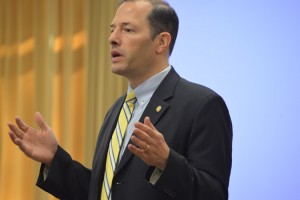State Rep. Fleischmann Visits Neag, Shares Thoughts on Future of Education in Connecticut
by: Madison Love
The Neag School of Education’s Center for Education Policy Analysis (CEPA) hosted “A Co nversation with Representative Andy Fleischmann” this past November at the Storrs campus. As the chairman of the Education Committee of the Connecticut State Assembly, State Rep. Fleischmann (West Hartford) spoke about the future of education in Connecticut schools and how education policy research could better inform policy making in Hartford and beyond.
nversation with Representative Andy Fleischmann” this past November at the Storrs campus. As the chairman of the Education Committee of the Connecticut State Assembly, State Rep. Fleischmann (West Hartford) spoke about the future of education in Connecticut schools and how education policy research could better inform policy making in Hartford and beyond.
Hosted by CEPA, this was the first time Fleischmann was invited to the Neag School of Education since he assumed office in 1995. As a major advocate for children and education, Fleischmann has worked on the state and national levels to help ensure that children are receiving the highest quality of education through research and policy implementation.
“One of the things that I would love to come out of this dialogue would be ideas, research, facts, and concepts about what Connecticut can do to make sure it has the most effective teachers, most effective principals, and the most effective superintendents,” Fleischmann said at the event.
“Neag is really trying to jump-start into being the center of policy analysis, and we want to move it into a new realm of influence,” says Morgaen Donaldson, Neag associate professor of educational leadership and the director of CEPA, which works with educational leaders and policymakers on issues related to the development, implementation, and consequences of education policies. “Fleischmann is one of the most influential policymakers in the state. To us, inviting him was a clear choice,” she says.
Ensuring Academic Excellence
Faculty from Neag and the College of Liberal Arts and Sciences, as well as local citizens, current undergraduate and graduate UConn students, and even area high school students visiting the University filled the seats.
Fleischmann spoke at length about developments following the midterm elections and how they will impact schools. He said that it is important for educational researchers to conduct relevant research to support policy changes and new initiatives. Given the recent federal level and statewide elections, he also questioned how policymakers will implement the new actions based on the educational research available.
Fleischmann said that, since 1995, Connecticut has put excessive amounts of money into school readiness programs across the state without conducting any longitudinal studies to gauge the effectiveness of these programs. He said that there should be more communication and more partnering to achieve that success.
“Ideally, we should get new people in the room and have the right type of data collected for longitudinal study designs. This way, we won’t continue to wonder, ‘Gee, how did it go?’ but rather, we will be proactive about these studies,” Fleischmann said.
Given the strong connection between education and politics, Fleischmann emphasized that research from schools such as UConn is essential to policymaking in Hartford. If teachers wanted to see something changed in the classroom, it would first have to begin with some kind of research to show why changes need to be made, he said.
“The No. 1 factor for a student excelling is the quality of the teacher; the second is the school leader. Wouldn’t it be neat for us to figure how to implement the best policies to ensure academic excellence?” Fleischmann said.
CEPA plans on having other key figures come to the Neag School for further discussion on education research and policymaking. In the upcoming semester, Donaldson says she hopes to invite other state representatives as well as members of the Connecticut Education Association, Connecticut Association of Public School Superintendents, and similar groups.
“I hope that by bringing in researchers to talk to us about their research on policy creation and implementation, it will foster a community of like-minded individuals who can make a change,” Donaldson says.